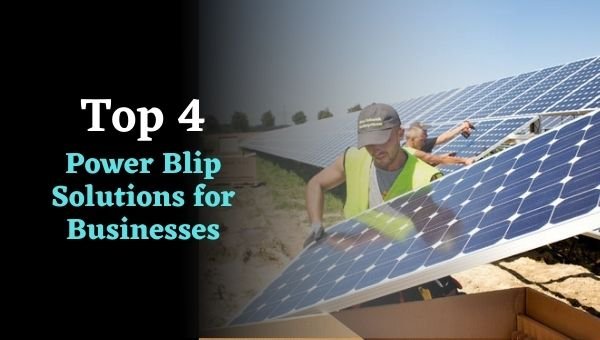Are you facing frequent power cuts at your company or organization? Has your employee’s productivity reduced to a great extent? And, are your stakeholders on the line of incurring a huge loss? If your answer to any of these questions is “Yes,” I can help you cope with power outages more confidently. All you need to do is implement a few reliable power blip solutions at your facility that saves both energy and cost.
So, let’s start the discussion about 4-major power blip solutions that can protect your business from blackouts.
1. Fuel Cells
Fuel cells are one of the finest energy solutions for businesses facing productivity and energy losses due to weather conditions and infrastructure failures. It is a well-engineered system that converts fuel into electricity quickly. And do you know what the best thing about fuel cells is? It uses an electrochemical process instead of combustion for energy conversion. And that further reduces the emission of harmful pollutants into the air, resulting in lesser respiratory diseases among the masses.
As far as technology is concerned, fuel cells are far better than diesel generators and CHP systems as the former has a cleaner mechanism than the latter. Apart from that, the performance of fuel cells is also excellent given that they are highly efficient. In simple words, the fuel cells consume less fuel than the conventional power grid in order to generate a particular amount of electricity.
That’s not all, fuel cells are highly flexible when it comes to the type of fuel. That means you can also use natural gas to run fuel cells instead of regular fuel. This will reduce the emission of carbon dioxide as compared to other combustion-based technologies.
2. Solar Panel and Storage
 Rooftop solar panels come second in the list of top power blip solutions. It is a renewable source of energy that emits zero carbon dioxide. In addition, it is widely known for its cleanest energy production mechanism that only a few other energy-generating machines have. What else, when you connect it with an energy storage system, you can get an extended amount of power during blackouts. For example, a few high-capacity lithium-ion batteries would be a suitable choice for energy storage.
Rooftop solar panels come second in the list of top power blip solutions. It is a renewable source of energy that emits zero carbon dioxide. In addition, it is widely known for its cleanest energy production mechanism that only a few other energy-generating machines have. What else, when you connect it with an energy storage system, you can get an extended amount of power during blackouts. For example, a few high-capacity lithium-ion batteries would be a suitable choice for energy storage.
Besides that, what you will be surprised to know is that the upfront cost of solar systems is pretty low. The high usage of solar panels is one of the major reasons for the reduction in its price. Additionally, it becomes more affordable and accessible also due to incentives offered by states, communities, and utilities.
Take note that you need not use solar panels just as a backup solution. You can also use it throughout the year to meet your energy needs. This will reduce not only the load on the grid but also your electricity bills during normal operations.
3. Diesel Generator
I think diesel generators are the most widely used energy producers across the globe, right? Whether you visit a production unit or a commercial building, the diesel generators would be there to supply energy when a power outage occurs. In short, it is a tried and tested source of backup power that is popular among entrepreneurs.
Not just that, diesel generators are easily available across the US and even have lower upfront costs. In case you also have some commercial spaces in addition to product manufacturing plants, then you can find, buy, and install them there easily. If that’s still less for you, I must inform you that diesel generators can be started pretty quickly, usually within 10 seconds. This is a good characteristic, needed especially in emergency situations when you want the power supply instantly.
4.CHP Systems
In case you don’t know what CHP systems stand for, it’s Combined Heat and Power systems. The main use of such systems is to recapture the residual heat created when the electricity is being generated. The heat recaptured can be used further for heating, cooling, or generating steam. Not only that, but the heat recovered throughout the process also helps in gaining efficiency that makes CHP systems a great choice for long-term investment for your business.
The good thing about CHP systems is that they need not be used just as a backup energy provider but also during regular operations. So, apart from reducing your utility cost, it is also helpful in eliminating the risk related to start-up failures for idle assets. And best of all, it uses less fuel because of higher efficiency. That means you can expect it to emit carbon dioxide in lesser amounts as compared to other combustion-centric energy solutions.
Final thoughts
So, I hope now you have enough solutions in mind to deal with frequent power cuts at your facility, right? By the way, if you have any questions regarding the installation process or costs of the above power outage solutions, you can get in touch with a leading energy solution provider in the US.







